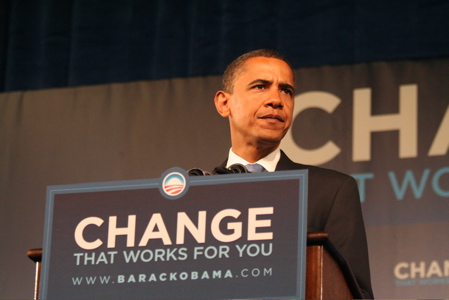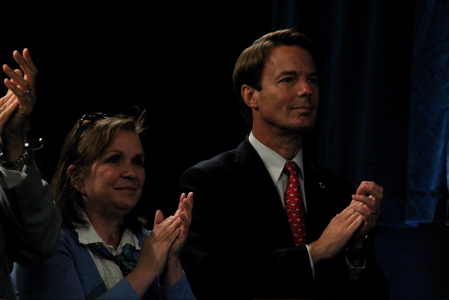By Christopher Hass - Jun 9th, 2008 at 2:11 pm EDT

Barack just concluded an economic policy speech in Raleigh, North Carolina. The speech marks the kick-off of a
two week tour focusing on the current economic crisis and the need for new economic policy:
You don�t have to read the stock tickers or scan the headlines in the financial section to understand the seriousness of the situation we�re in right now. You just have to go to Pennsylvania and listen to the man who lost his job but can�t even afford the gas to drive around and look for a new one. Or listen to the woman from Iowa who works the night shift after a full day of class and still can�t pay the medical bills for a sister who�s ill. Or talk to the worker I met in Indiana who worked at the same plant his father worked at for thirty years until they moved it to Mexico and made the workers actually pack up the equipment themselves so they could send it to China.
... We did not arrive at the doorstep of our current economic crisis by some accident of history. This was not an inevitable part of the business cycle that was beyond our power to avoid. It was the logical conclusion of a tired and misguided philosophy that has dominated Washington for far too long.
Also on hand for the speech were John and Elizabeth Edwards:
 Read the full text of Barack's prepared remarks . . .
Read the full text of Barack's prepared remarks . . .Remarks of Senator Barack Obama
Change That Works for You
Monday, June 9th, 2008
Raleigh, North Carolina
As prepared for delivery
Before we begin, I just want to take a minute to thank Senator Clinton for the kind and generous support she offered on Saturday. She ran an historic campaign that shattered barriers on behalf of my daughters and women everywhere who now know there are no limits to their dreams. And more, she inspired millions of women and men with her strength, her courage, and her unyielding commitment to the causes that brought us here today � the hopes and aspirations of working Americans.
Our party and our country are stronger because of the work she has done throughout her life, and I look forward to working with her in these coming months and years to lay out the case for change and set a new course for this country.
I�ve often said that this election represents a defining moment in our history. On major issues like the war in Iraq or the warming of our planet, the decisions we make in November and over the next few years will shape a generation, if not a century.
That is especially true when it comes to our economy.
<...>
But when it comes to the economy, John McCain and I have a fundamentally different vision of where to take the country. Because for all his talk of independence, the centerpiece of his economic plan amounts to a full-throated endorsement of George Bush�s policies. He says we�ve made �great progress� in our economy these past eight years. He calls himself a fiscal conservative and on the campaign trail he�s passionate critic of government spending, and yet he has no problem spending hundreds of billions of dollars on tax breaks for big corporations and a permanent occupation of Iraq � policies that have left our children with a mountain of debt.
George Bush�s policies have taken us from a projected $5.6 trillion dollar surplus at the end of the Clinton Administration to massive deficits and nearly four trillion dollars in new debt today. We were promised a fiscal conservative. Instead, we got the most fiscally irresponsible administration in history. And now John McCain wants to give us another. Well we�ve been there once, and we�re not going back. It�s time to move this country forward.
<...>
This is the choice you will face in November. You can vote for John McCain, and see a continuation of Bush economic policies � more tax cuts to the wealthy, more corporate tax breaks, more mountains of debt, and little to no relief for families struggling with the rising costs of everything from health care to a college education.
But I don�t think that is the future we want. The Americans I�ve met over the last sixteen months in town halls and living rooms; on farms and front porches � they may come from different places and have different backgrounds, but they hold common hopes and dream the same simple dreams. They know government can�t solve all their problems, and they don�t expect it to. They believe in personal responsibility, and hard work, and self-reliance. They don�t like seeing their tax dollars wasted.
But we also believe in an America where unrivaled prosperity brings boundless opportunity � a place where jobs are there for the willing; where hard work is rewarded with a decent living; where no matter how much you start with or where you come from or who your parents are, you can make it if you try.
We believe in the country that gave my grandfather and a generation of heroes the chance to go to college on the GI Bill when they came home from World War II � a GI Bill that helped create the largest middle-class in history.
We believe in the country that made it possible for my mother � a single parent who didn�t have much � to send my sister and me to the best schools in the country with the help of scholarships.
We believe in the country that allowed my father-in-law � a city worker at a water filtration plant on the South Side of Chicago � to provide for his wife and two children on a single salary. He was diagnosed with multiple sclerosis at age thirty, but that didn�t stop him from going to work every day � often with the help of a walker � so that could send my wife and her brother to one of the best colleges in the nation.
His job didn�t just give him a paycheck; it gave him a sense of dignity and self-worth. His country didn�t just reward wealth, but the work and the workers who created it. And that is the America we believe in.
That is the choice we face right now � a choice between more of the same policies that have widened inequality, added to our debt, and shaken the foundation of our economy, or change that will restore balance to our economy; that will invest in the ingenuity and innovation of our people; that will fuel a bottom-up prosperity to keep America strong and competitive in the 21st century.
It is not left or right � liberal or conservative � to say that we have tried it their way for eight long years. And it has failed. It is time to try something new. It is time for change.
The challenges we face are great, and we may not meet them in one term or with one President. But history tells us we have met greater challenges before. And the seriousness of this moment tells us we can�t afford not to try.
So as we set out on this journey, let us also forge a new path � a path that leads to unrivaled prosperity; to boundless opportunity; to the America we believe in and a dream that will always endure. Thank you, and may God Bless America.
By Greg Sargent - June 9, 2008, 1:42PM
Obama's speech in Raleigh launching his economy tour is underway, and towards the end, during a discussion of health care, he drops a surprise aside that wasn't in the speech's prepared remarks:
"By the way, I'm going to be partnering with Elizabeth Edwards, we're going to be figuring all this out."
More on this when we can establish the details.
Late Update: The key political context here, of course, is that back in April, Elizabeth
revealed that Obama's health care plan wasn't her favorite. Enlisting her as a public voice on health care could obviously help with the Obama camp's outreach to women and help win over skeptics in general.
Late Late Update: For an idea of just how effective Elizabeth Edwards might be as a surrogate on health care for Obama and against McCain, take a look at
this take-down by Elizabeth of McCain's plan.
By Eric Kleefeld - June 9, 2008, 2:12PM
In a further sign that Republican hopes are fading badly, the head of the Senate GOP's campaign committee
has set a new goal for the party this Fall: Not to lose too many Senate seats.
NRSC chair John Ensign has moved the goal posts, saying that the GOP will have succeeded if they don't lose more than eight seats.
Ensign pointed out that if the Dems win nine seats they'll get to the filibuster-proof magic number of 60 -- at which point, Ensign warned, "they will be able to do pretty much whatever they want."
So if the Dems can't get to a 60-seat super-majority, the GOP will have won. Talk about lowering the bar.